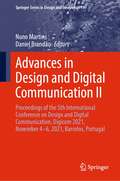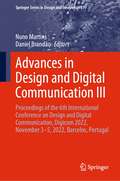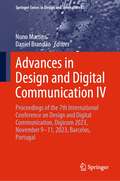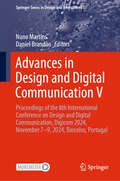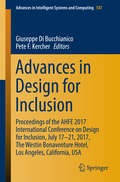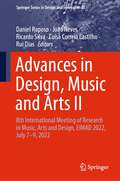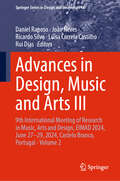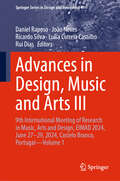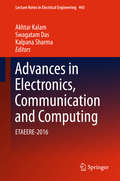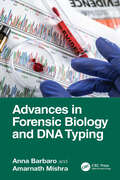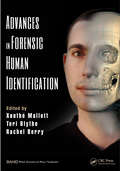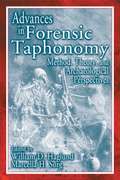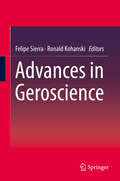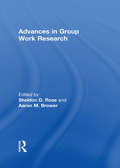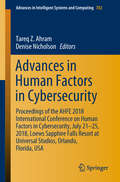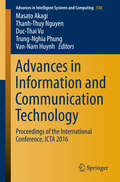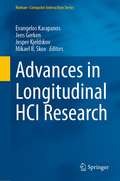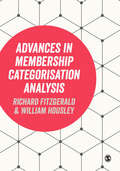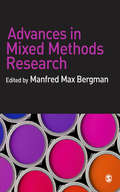- Table View
- List View
Advances in Design and Digital Communication II: Proceedings of the 5th International Conference on Design and Digital Communication, Digicom 2021, November 4–6, 2021, Barcelos, Portugal (Springer Series in Design and Innovation #19)
by Nuno Martins Daniel BrandãoThis book reports on research findings and practical lessons featuring advances in the areas of digital and interaction design, graphic design and branding, design education, society and communication in design practice, and related ones. Gathering the proceedings of the 5th International Conference on Digital Design and Communication, Digicom 2021, held on November 4–6, 2021, in Barcelos, Portugal, and continuing the tradition of the previous book, it describes new design strategies and solutions to foster digital communication within and between the society, institutions and brands. By highlighting innovative ideas and reporting on multidisciplinary projects, it offers a source of inspiration for designers of all kinds, including graphic and web designers, UI, UX and social media designers, and to researchers, advertisers, artists, and brand and corporate communication managers alike.
Advances in Design and Digital Communication III: Proceedings of the 6th International Conference on Design and Digital Communication, Digicom 2022, November 3–5, 2022, Barcelos, Portugal (Springer Series in Design and Innovation #27)
by Nuno Martins Daniel BrandãoThis book reports on research findings and practical lessons featuring advances in the areas of digital and interaction design, graphic design and branding, design education, society and communication in design practice, and related ones. Gathering the proceedings of the 6th International Conference on Digital Design and Communication, Digicom 2022, held on November 3–5, 2022, as an hybrid event, from Barcelos, Portugal, and continuing the tradition of the previous book, it describes new design strategies and solutions to foster digital communication within and between the society, institutions and brands. By highlighting innovative ideas and reporting on multidisciplinary projects, it offers a source of inspiration for designers of all kinds, including graphic and web designers, UI, UX and social media designers, and to researchers, advertisers, artists, and brand and corporate communication managers alike.
Advances in Design and Digital Communication IV: Proceedings of the 7th International Conference on Design and Digital Communication, Digicom 2023, November 9–11, 2023, Barcelos, Portugal (Springer Series in Design and Innovation #35)
by Nuno Martins Daniel BrandãoThis book reports on research findings and practical lessons featuring advances in the areas of digital and interaction design, graphic design and branding, design education, society and communication in design practice, and related ones. Gathering the proceedings of the 7th International Conference on Digital Design and Communication, Digicom 2023, held on November 9-11, 2023, as a hybrid event, in/from Barcelos, Portugal, this book continues the tradition of the previous ones reporting on new design strategies to foster digital communication within and between the society, institutions and brands. By highlighting innovative ideas and reporting on multidisciplinary projects, it offers a source of inspiration for designers of all kinds, including graphic and web designers, UI, UX and social media designers, and to researchers, advertisers, artists, and brand and corporate communication managers alike.
Advances in Design and Digital Communication V: Proceedings of the 8th International Conference on Design and Digital Communication, Digicom 2024, November 7–9, 2024, Barcelos, Portugal (Springer Series in Design and Innovation #51)
by Nuno Martins Daniel BrandãoThis book reports on research findings and practical lessons featuring advances in the areas of digital and interaction design, graphic design and branding, design education, society and communication in design practice, and related ones. Gathering the proceedings of the 8th International Conference on Digital Design and Communication, Digicom 2024, held on November 7-9 2024, as a hybrid event, in/from Barcelos, Portugal, this book continues the tradition of the previous ones reporting on new design strategies to foster digital communication within and between the society, institutions and brands. By highlighting innovative ideas and reporting on multidisciplinary projects, it offers a source of inspiration for designers of all kinds, including graphic and web designers, UI, UX and social media designers, and to researchers, advertisers, artists, and brand and corporate communication managers alike.
Advances in Design for Inclusion: Proceedings of the AHFE 2017 International Conference on Design for Inclusion, July 17–21, 2017, The Westin Bonaventure Hotel, Los Angeles, California, USA (Advances in Intelligent Systems and Computing #587)
by Giuseppe Di Bucchianico Pete F KercherThis book focuses on a range of topics in design, such as universal design, design for all, digital inclusion, universal usability, and accessibility of technologies independently of people s age, economic situation, education, geographic location, culture and language. It especially focuses on accessibility for people with auditory, cognitive, neurological, and visual impairments, ageing populations, and mobility for physical special needs. The book explores some of the overlaps between inclusive design and web accessibility to help managers, designers, developers, policy makers, and researchers optimize their efforts in these overlapping areas. Based on the AHFE 2016 International Conference on Design for Inclusion, held on July 27-31, 2016, in Walt Disney World(r), Florida, USA, this book discusses new design technologies, highlighting various requirements of individuals within a community. Thanks to its multidisciplinary approach, the book represents a useful resource for readers with different kinds of backgrounds and provides them with a timely, practice-oriented guide to design for inclusion. "
Advances in Design, Music and Arts II: 8th International Meeting of Research in Music, Arts and Design, EIMAD 2022, July 7–9, 2022 (Springer Series in Design and Innovation #25)
by Daniel Raposo João Neves Luísa Correia Castilho Rui Dias Ricardo SilvaThis book presents cutting-edge methods and findings that are expected to contribute to significant advances in the areas of communication design, fashion design, interior design and product design, as well as musicology and other related areas. It especially focuses on the role of digital technologies, and on strategies fostering creativity, collaboration, education, as well as sustainability and accessibility in the broadly-intended field of design. Gathering the proceedings of the 8th EIMAD conference, held on July 7–9, 2022, and organized by the School of Applied Arts of the Instituto Politécnico de Castelo Branco, in Portugal, this book offers a timely guide and a source of inspiration for designers of all kinds, advertisers, artists, and entrepreneurs, as well as educators and communication managers.
Advances in Design, Music and Arts III: 9th International Meeting of Research in Music, Arts and Design, EIMAD 2024, June 27–29, 2024, Castelo Branco, Portugal - Volume 2 (Springer Series in Design and Innovation #48)
by Daniel Raposo João Neves Luísa Correia Castilho Rui Dias Ricardo SilvaThis book presents cutting-edge methods and findings that are expected to contribute to significant advances in the areas of communication design, fashion design, interior design and product design, as well as musicology and other related areas. It especially focuses on the role of digital technologies, and on strategies fostering creativity, collaboration, education, as well as sustainability and accessibility in the broadly-intended field of design. Gathering the second volume of the proceedings of the 9th EIMAD conference, held in hybrid format on June 27–29, 2023, and organized by the School of Applied Arts of the Instituto Politécnico de Castelo Branco, in Portugal, this book offers a timely guide and a source of inspiration for designers of all kinds, advertisers, artists, and entrepreneurs, as well as educators and communication managers.
Advances in Design, Music and Arts III: 9th International Meeting of Research in Music, Arts and Design, EIMAD 2024, June 27–29, 2024, Castelo Branco, Portugal—Volume 1 (Springer Series in Design and Innovation #49)
by Daniel Raposo João Neves Luísa Correia Castilho Rui Dias Ricardo SilvaThis book presents cutting-edge methods and findings that are expected to contribute to significant advances in the areas of communication design, fashion design, interior design and product design, as well as musicology and other related areas. It especially focuses on the role of digital technologies, and on strategies fostering creativity, collaboration, education, as well as sustainability and accessibility in the broadly-intended field of design. Gathering the first volume of the proceedings of the 9th EIMAD conference, held in hybrid format on June 27–29, 2023, and organized by the School of Applied Arts of the Instituto Politécnico de Castelo Branco, in Portugal, this book offers a timely guide and a source of inspiration for designers of all kinds, advertisers, artists, and entrepreneurs, as well as educators and communication managers.
Advances in Electronics, Communication and Computing: ETAEERE-2016 (Lecture Notes in Electrical Engineering #443)
by Kalpana Sharma Swagatam Das Akhtar KalamThis book is a compilation of research work in the interdisciplinary areas of electronics, communication, and computing. This book is specifically targeted at students, research scholars and academicians. The book covers the different approaches and techniques for specific applications, such as particle-swarm optimization, Otsu's function and harmony search optimization algorithm, triple gate silicon on insulator (SOI)MOSFET, micro-Raman and Fourier Transform Infrared Spectroscopy (FTIR) analysis, high-k dielectric gate oxide, spectrum sensing in cognitive radio, microstrip antenna, Ground-penetrating radar (GPR) with conducting surfaces, and digital image forgery detection. The contents of the book will be useful to academic and professional researchers alike.
Advances in Evidence-Based Policing (Crime Science Series)
by Johannes Knutsson Lisa TompsonThe evidence-based policing (EBP) movement has intensified in many countries around the world in recent years, resulting in a proliferation of policies and infrastructure to support such a transformation. This movement has come to be associated with particular methods of evaluation and systematic review, which have been drawn from what is assumed to prevail in medicine. Given the credibility EBP is currently enjoying with both practitioners and government, it is timely to subject its underpinning logic to thoughtful scrutiny. This involves deliberating upon the meaning of evidence and what different models of knowledge accumulation and research methods have to offer in realising the aims of EBP. The communication and presentation of evidence to practitioner audiences is another important aspect of EBP, as are collaborative efforts to ‘co-produce’ new knowledge on police practice. This is the first book that takes a kaleidoscopic approach to depict what EBP presently is and how it could develop. The chapters individually and collectively challenge the underlying logic to the mainstream EBP position, and the book concludes with an agenda for a more inclusive conceptualisation of evidence and EBP for the future. It is aimed at students and academics who are interested in being part of this movement, as well as policymakers and practitioners interested in integrating EBP principles into their practices.
Advances in Forensic Biology and DNA Typing
by Anna Barbaro Amarnath MishraAdvances in Forensic Biology and DNA Typing examines a broad range of forensic DNA applications and topics, based on internationally recognized best practices. As a contributed volume that includes chapters by experts from around the world, the book covers a broad range of forensic DNA applications and topics. This includes current methods for DNA extraction and typing as well as other technologies and emergent techniques in the field such as Trace and Touch DNA, Forensic DNA Phenotyping (FDP), Forensic Investigative Genetic Genealogy (FIGG), Rapid DNA Biological Fluid Identification by epigenetics, and Pharmacogenomics. The book also explores the development and usage of forensic biology for the analysis of non- human samples and the relevance of DNA databases, management systems and quality certification in forensic.Key features:• Highlights sources of DNA (including biological fluids, hair, bones, teeth) detailing how to address the challenges of various sample types, quantities, and environmental factors• Presents best practices in investigative and collection procedures, as well as evaluative and testing methods, of biological samples• Addresses both human and non- human DNA analyses and applications for both criminal and wildlife investigationsAdvances in Forensic Biology and DNA Typing is a highly illustrated guide that will serve as a useful reference for forensic laboratory professionals, investigators, and students, as well as legal professionals.
Advances in Forensic Human Identification
by Teri Blythe Rachel Berry Xanthé MallettAs forensic human identification receives increased global attention, practitioners, policy makers, and students need an appropriate resource that describes current methods and modalities that have shaped today’s policies and protocols. A supplemental follow-up to Forensic Human Identification: An Introduction, Advances in Forensic Human Identification covers advances in the most well-known scientific techniques and discusses new and developing subjects and modalities of human identification.A collection of contributions from worldwide experts, the book embraces a broad context and looks at several issues beyond physical identification of human remains or offenders. The book examines online, sexual, and biometric identities and discusses problems associated with investigative practice, such as the developing use of the Internet as a distribution and communication medium for criminal activities. It also explores miscarriages of justice that can result from flawed applications or interpretations of forensic evidence. Finally, it looks at the future of forensic science in the United Kingdom in light of financial challenges and the closure of the Forensic Science Service. Where appropriate, case studies illustrate the use of techniques and the associated problems described in the text. The downloadable resources include images in full color.This volume provides an important contribution to the ongoing practitioner and academic debates surrounding the application of forensic technologies. The insight presented is destined to springboard further inquiry into enhanced techniques and underlies the need for more research into the appropriate use of identification techniques to solve the mysteries of the unknown.
Advances in Forensic Taphonomy: Method, Theory, and Archaeological Perspectives
by William D. Haglund Marcella H. SorgLiberally illustrated with photographs, maps, and other images, Advances in Forensic Taphonomy: Method, Theory, and Archaeological Perspectives offers modern techniques for obtaining clues from postmortem evidence. This bestselling reference examines techniques in recovery and analysis, coverage of mass grave investigation, applications of nuclear and mitochondrial DNA techniques, interpretation of burned human remains, the discrimination of trauma from postmortem change, and taphonomic interpretation of water deaths both at the scene and in the lab. It also discusses microenvironmental variation and decomposition in different environments, as well as geochemical and entomological analysis.
Advances in Geroscience
by Felipe Sierra Ronald KohanskiThis book provides the first comprehensive overview of a new scientific discipline termed Geroscience. Geroscience examines the molecular and cellular mechanisms that might explain why aging is the main risk factor for most chronic diseases affecting the elderly population. Over the past few decades, researchers have made impressive progress in understanding the genetics, biology and physiology of aging. This book presents vital research that can help readers to better understand how aging is a critical malleable risk factor in most chronic diseases, which, in turn, could lead to interventions that can help increase a healthy lifespan, or 'healthspan. ' The book begins with an analysis of the Geroscience hypothesis, as well as the epidemiological underpinnings that define aging as a candidate main risk factor for most chronic diseases. Next, each chapter focuses on one particular disease, or group of diseases, with an emphasis on how basic molecular and cellular biology might explain why aging is a major risk factor for it. Coverage in the book includes: cancer, cardiovascular disease, dementias, stroke, Parkinson's and Alzheimer's diseases, osteoporosis, arthritis, diabetes asthma, emphysema, kidney disease, vision impairment, and AIDS/HIV. It finishes with a chapter on pain in the elderly and an overview of future steps needed to bring the newly acquired knowledge into the clinic and the public at large.
Advances in Group Work Research
by Aaron Brower Sheldon D RoseIn this comprehensive overview of the state of the art in the field, group workers and social scientists explore group research issues. Learn how they grapple with the major problems associated with doing research on treatment groups. While discussing the outcomes of their group treatment programs, the authors address such issues as non-random assignment, impact of group process on outcome, retrospective research design, the unit of analysis, multivariate analysis, single-case designs, and small samples. Each insightful chapter illustrates the decisions and compromises that researchers must make to explore group phenomenon and treatment. Advances in Group Work Research is an ideal supplementary text or casebook for practice-research courses. It will also be useful for those interested in empirical group work, group research, and practice research generally.This book presents a sample of papers from the last three years’Annual Symposium on Empirical Foundations of Group Work.
Advances in Human Dynamics for the Development of Contemporary Societies: Proceedings of the AHFE 2021 Virtual Conference on Human Dynamics for the Development of Contemporary Societies, July 25-29, 2021, USA (Lecture Notes in Networks and Systems #277)
by Daniel Raposo Nuno Martins Daniel BrandãoThis book addresses the importance of human factors in the design of artifacts and systems that serves contemporary individual and societal needs. It reports on cutting-edge, multidisciplinary design research and practices fostering creativity, interaction and co-creation, sustainability, digital development, mobility, as well as science and education. Gathering contributions to the first edition of the AHFE 2021 Affiliated Conference on Human Dynamics for the Development of Contemporary Societies, held virtually on July 25-29, 2021, from USA, this book, which brings together experts with different design and human factors engineering as well as user interface and user experience backgrounds, offers a timely perspective on the role of human factors and design in the developments of modern society and is expected to foster new approaches and interdisciplinary collaboration.
Advances in Human Factors in Cybersecurity: Proceedings of the AHFE 2018 International Conference on Human Factors in Cybersecurity, July 21-25, 2018, Loews Sapphire Falls Resort at Universal Studios, Orlando, Florida, USA (Advances in Intelligent Systems and Computing #782)
by Denise Nicholson Tareq Z. AhramThis book reports on the latest research and developments in the field of cybersecurity, particularly focusing on personal security and new methods for reducing human error and increasing cyber awareness, as well as innovative solutions for increasing the security of advanced Information Technology (IT) infrastructures. It covers a broad range of topics, including methods for human training; novel cyber-physical and process-control systems; social, economic, and behavioral aspects of cyberspace; issues concerning the cybersecurity index; security metrics for enterprises; and risk evaluation. Based on the AHFE 2018 International Conference on Human Factors in Cybersecurity, held on July 21–25, 2018, in Orlando, Florida, USA, the book not only presents innovative cybersecurity technologies, but also discusses emerging threats, current gaps in the available systems, and future challenges that can be successfully overcome with the help of human factors research.
Advances in Human Factors in Cybersecurity: Proceedings of the AHFE 2019 International Conference on Human Factors in Cybersecurity, July 24-28, 2019, Washington D.C., USA (Advances in Intelligent Systems and Computing #960)
by Waldemar Karwowski Tareq AhramThis book reports on the latest research and developments in the field of cybersecurity, particularly focusing on personal security and new methods for reducing human error and increasing cyber awareness, as well as innovative solutions for increasing the security of advanced Information Technology (IT) infrastructures. It covers a broad range of topics, including methods for human training; novel cyber-physical and process-control systems; social, economic, and behavioral aspects of cyberspace; issues concerning the cybersecurity index; security metrics for enterprises; and risk evaluation. Based on the AHFE 2019 International Conference on Human Factors in Cybersecurity, held on July 24-28, 2019, in Washington D.C., USA, the book not only presents innovative cybersecurity technologies, but also discusses emerging threats, current gaps in the available systems, and future challenges that may be successfully overcome with the help of human factors research.
Advances in Information and Communication Technology: Proceedings of the International Conference, ICTA 2016 (Advances in Intelligent Systems and Computing #538)
by Van-Nam Huynh Masato Akagi Thanh-Thuy Nguyen Duc-Thai Vu Trung-Nghia PhungThis book features papers presented at the International Conference on Advances in Information and Communication Technology (ICTA 2016), which was held in Thai Nguyen city, Vietnam, from December 1 to 13, 2016. The conference was jointly organized by Thai Nguyen University of Information and Communication Technology (ICTU), the Institute of Information Technology - Vietnam Academy of Science and Technology (IoIT), Feng Chia University, Taiwan (FCU), the Japan Advanced Institute of Science and Technology (JAIST) and the National Chung Cheng University, Taiwan (CCU) with the aim of bringing together researchers, academics, practitioners and students to not only share research results and practical applications but also to foster collaboration in information and communication technology research and education. The book includes the 66 best peer-reviewed papers, selected from the 150 submissions received.
Advances in Longitudinal HCI Research (Human–Computer Interaction Series)
by Evangelos Karapanos Jens Gerken Jesper Kjeldskov Mikael B. SkovLongitudinal studies have traditionally been seen as too cumbersome and labor-intensive to be of much use in research on Human-Computer Interaction (HCI). However, recent trends in market, legislation, and the research questions we address, have highlighted the importance of studying prolonged use, while technology itself has made longitudinal research more accessible to researchers across different application domains. Aimed as an educational resource for graduate students and researchers in HCI, this book brings together a collection of chapters, addressing theoretical and methodological considerations, and presenting case studies of longitudinal HCI research. Among others, the authors:discuss the theoretical underpinnings of longitudinal HCI research, such as when a longitudinal study is appropriate, what research questions can be addressed and what challenges are entailed in different longitudinal research designsreflect on methodological challenges in longitudinal data collection and analysis, such as how to maintain participant adherence and data reliability when employing the Experience Sampling Method in longitudinal settings, or how to cope with data collection fatigue and data safety in applications of autoethnography and autobiographical design, which may span from months to several yearspresent a number of case studies covering different topics of longitudinal HCI research, from “slow technology”, to self-tracking, to mid-air haptic feedback, and crowdsourcing.
Advances in Membership Categorisation Analysis
by William Housley Dr Richard FitzgeraldThis is an exciting addition to the dynamic, multidisciplinary field of membership categorization analysis. Bringing together the biggest names in MCA this landmark publication provides a contemporary analysis of the field and a platform for emerging researchers and students to build upon. The book sets out the current methodological developments of MCA highlighting its analytic strength – particularly when examining social identity and social knowledge. It provides a sophisticated tool of qualitative analysis and draws from a wide range of empirical studies provided by global scholars. The culmination of years of international research this agenda-setting text will be essential reading for academics and advanced students using membership categorization across the social sciences; particularly in media and communication studies, sociology, psychology, education, political science and linguistics.
Advances in Membership Categorisation Analysis
by William Housley Richard FitzgeraldThis is an exciting addition to the dynamic, multidisciplinary field of membership categorization analysis. Bringing together the biggest names in MCA this landmark publication provides a contemporary analysis of the field and a platform for emerging researchers and students to build upon. The book sets out the current methodological developments of MCA highlighting its analytic strength – particularly when examining social identity and social knowledge. It provides a sophisticated tool of qualitative analysis and draws from a wide range of empirical studies provided by global scholars. The culmination of years of international research this agenda-setting text will be essential reading for academics and advanced students using membership categorization across the social sciences; particularly in media and communication studies, sociology, psychology, education, political science and linguistics.
Advances in Mixed Methods Research: Theories and Applications
by Manfred Max BergmanAdvances in Mixed Methods Research provides an essential introduction to the fast-growing field of mixed methods research. Bergman's book examines the current state of mixed-methods research, exploring exciting new ways of conceptualizing and conducting empirical research in the social and health sciences. Contributions from the world's leading experts in qualitative, quantitative, and mixed methods approaches are brought together, clearing the way for a more constructive approach to social research. These contributions cover the main practical and methodological issues and include a number of different visions of what mixed methods research is. The discussion also covers the use of mixed methods in a diverse range of fields, including sociology, education, politics, psychology, computational science and methodology. This book represents an important contribution to the ongoing debate surrounding the use of mixed methods in the social sciences and health research, and presents a convincing argument that the conventional, paradigmatic view of qualitative and quantitative research is outdated and in need of replacement. It will be essential reading for anyone actively engaged in qualitative, quantitative and mixed methods research and for students of social research methods. Manfred Max Bergman is Chair of Methodology and Political Sociology at the University of Basel.
Advances in Natural, Human-Made, and Coupled Human-Natural Systems Research: Volume 1 (Lecture Notes in Networks and Systems #234)
by Svetlana G. Maximova Roman I. Raikin Alexander A. Chibilev Marina M. SilantyevaThis book is a collection of cutting-edge and cross-disciplinary studies on natural, human-made, and coupled human-natural systems, addressing the challenge of developing integrated knowledge from multiple disciplines. The authors explore the structure, function, and dynamic mechanisms of various systems, both natural and human-made, as well as analyze their reciprocal interactions under the concept of “coupled human-natural systems.” These interactions are used to understand feedback, nonlinearities, thresholds, time lags, legacy effects, and path dependencies, emerging across multiple spatial, temporal, and organizational scales. In other words, this book is a collection of advanced research on unique properties of natural and human-made systems, as well as human-environment dynamics, reciprocal relationships, and cross-scale interactions.The authors outline prospects on building a holistic view of social development and coherent sustainability. Among the topics covered are the following: human networks research; adaptation of local people to social and environmental challenges; coupled dynamics of socioeconomic and environmental systems; critical issues in social science climate change research; education for greater sustainability; peace, justice, and strong institutions; advances in cultural traditions and strategies for social stability; innovative development and barriers to sustainable development; economic systems in the age of digital changes and unstable external environments. The scholars analyze how more effective technologies can enhance resilience, reduce vulnerability, and minimize human impacts on natural systems, taking into consideration critical thresholds to prevent harmful feedback to human systems.The authors grasp the complexity of systems by integrating knowledge of constituent subsystems and their interactions. The framework developed by the authors is used to integrate human and natural systems for achieving greater sustainability, covering critical threats, challenges, and best governance approaches and practices. The research results obtained from studies on coupled human-natural systems are stronger, the authors argue, if compared with traditional (discipline) approaches.
Advances in Natural, Human-Made, and Coupled Human-Natural Systems Research: Volume 2 (Lecture Notes in Networks and Systems #250)
by Svetlana G. Maximova Roman I. Raikin Alexander A. Chibilev Marina M. SilantyevaThis book is a unique collection of advanced research on natural, human-made, and coupled human–natural systems. The contributors analyze the current state of knowledge, address methodological challenges, and explore engaging cases. The chapters demonstrate the balanced disciplinary strength and discuss interdisciplinary perspectives. The authors undertake a holistic and spatially integrative analysis to understand the sustainability of environmental, economic, and social systems, emphasizing the coupled nature of such systems. In particular, the chapters explore biodiversity conservation and natural resources, the sustainability of natural and human-altered ecosystems, sustainability–vulnerability issues in coupled human–natural systems, mechanisms to foster sustainable environmental practices, eventually accumulating sustainability research and practice in various fields. More than that, the challenges of educational and economic systems are studied closely. The authors rely on unique data, develop regional and local knowledge, and explore global trends at local scales. A separate focus is devoted to human health and well-being. The book has seven sections: (1) Advances in Natural and Coupled Human–Natural Systems Research; (2) Economic Systems in the Age of Digital Changes and Unstable Environments; (3) Sustainable Social Systems, Migration Flows, and Social Cohesion; (4) Taking Action for Greater Security and Effective Partnerships for Sustainable Development; (5) Systemic Challenges and Changes in Education Systems in Russia and Around the Globe; (6) Advances in Cultural Traditions and Innovation, Development Barriers, and Social Stability; (7) Human Health and Well-being: Taking Action for Sustainable Development. Written by scholars and practitioners from multiple fields of knowledge, the book is designed for a broader audience interested in the following research areas: systems research and thinking, sustainability research and thinking, system dynamics, management of complexity, decision analysis, organization theory, governance, natural resources, environmental studies, economic development, social policies, cleaner production, innovation, cultural studies, and sustainable practices.
